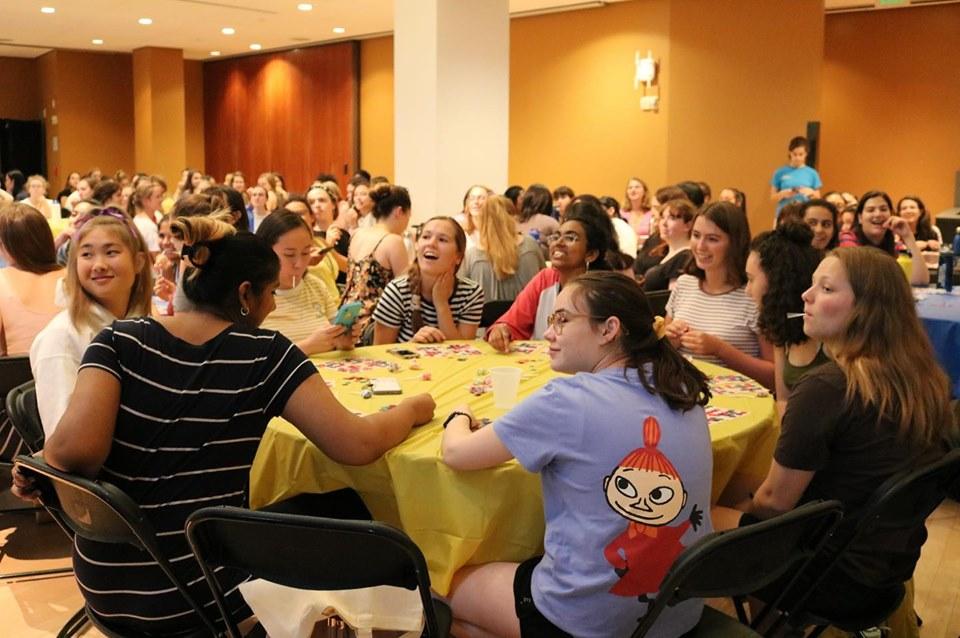It’s been approximately a month since first years arrived on campus and the transition was almost seamless for many. Unlimited food, more sleep, dessert after every meal – what could be better? Victoria Percoco ‘23 says that she has developed, “A newfound sense of independence in adventure in this amazing new place.” However, other students have been struggling far more with the drastic lifestyle changes. To get a better understanding of how the first years have been coping, The Wellesley News surveyed first years about their ups, their downs and advice upperclassmen had for first years.
One of the biggest issues that first years have faced so far is struggling to leave the high school ‘eat or be eaten” mentality. From 9th to 12th grade, we are told one thing: if we don’t work until we collapse, we aren’t working hard enough. It is undoubtedly hard to remember that the “getting into a good college” hurdle has already been defeated. Still, first years continue to push themselves beyond their thresholds, leading to fatigue and not enough time for fun. Allysa Robbins ’22 advises, “Be gentle with yourself and realize that the transition to college is HARD no matter who you are.”
Then, there’s the matter of adapting to living with strangers. Freshmen either found their “ideal” matches on social media, or decided to try for random roommates. Regardless of how roommates were found, many struggle with adequate communication in their dorms. And in the case that the roommates don’t get along well, Housing Services promises them that they will be transferred to different rooms within two weeks. However, it has been approximately a month since school began, and housing has barely started the transferring process. As a result, many students are struggling in rooms with people they might not get along with. An anonymous first year says that first years should, “Talk to [their] roommate beforehand, make sure [they] actually like them. If [they] don’t, contact housing BEFORE [they] move in.” As a result, many students are struggling to deal with their current living arrangements. Anonymous ‘23 also responded that the hardest thing for them has been “ . . . feeling like I am trapped at times,” which is not how we want our first year students to be feeling.
Another important factor to think about is mental health amongst the first year students. As we all know, a change in environment can be a wonderful, healing process when dealing with stress and anxiety . . . but it can also be very triggering. A prime example of this would be eating disorders and dining hall food. Recovering from an eating disorder is a very delicate process, which requires careful care. However, going from an environment where taking care of your food habits is much easier to a place where the majority of dining halls close at 7 p.m. has proven to be destructive to many students. Furthermore, it can be very hard to find the “right” food to eat; it can’t be helped that students have different palates, and they want different food. However, when the pasta is uncooked, or the meat is hard to chew through, students will often simply skip meals. This creates a culture of unhealthy eating across campus. Especially for students recovering from issues around eating, this dietary transition has proven to be very difficult to get around. Another anonymous student ‘23 responded that students should “. . .take advantage of the mental health resources on campus (or just advisor/mentor resources in general).” So, freshmen, if you feel this way or can’t deal with the stress of classes in general, please reach out and talk to Health Services department about working out solutions.
While many things have been hard for the new students, not everything has been bad. Chaucer Langbert ‘23 says, “. . . I’ve enjoyed being surrounded by immensely capable and strong women.” Wellesley Women are brilliant, kind, and independent. Although the transition can be difficult, the helpful RAs and upperclassmen have greatly helped their curious, homesick freshmen friends. Amy Rose ‘23 loves the environment that the older students have helped create; “[. . .] the upperclassmen I’ve met have been so friendly and positive!” So to those of you who’ve provided us with helping hands, thanks from all of our class. And to all the freshman at Wellesley, hang in there. It will get better. Robbins says, “Be patient and understand that by the next year you’ll have this campus down and at least a few people you can count on.”




